Postpublished at 10:46 BST 4 August 2014
Prince William tells the Liege service: "Belgium's steadfast remembrance of your war dead and ours is a great credit to your nation."
Monday 4 August 2014 marked the 100th anniversary of the start of Britain's involvement in WW1
About 17m soldiers and civilians worldwide were killed between 1914 and 1918
Royal Family members and world leaders attended commemorative events in the UK and elsewhere
An international ceremony of reconciliation was held outside the Belgian city of Mons
The day's events ended with a candle-lit vigil at Westminster Abbey and "lights out" events around the UK
Tom Moseley, Patrick Evans, Dhruti Shah, Anna Jones, Claire Bates, Nick Eardley, Kerry Alexandra, Kate McGeown and Gerry Holt
Prince William tells the Liege service: "Belgium's steadfast remembrance of your war dead and ours is a great credit to your nation."
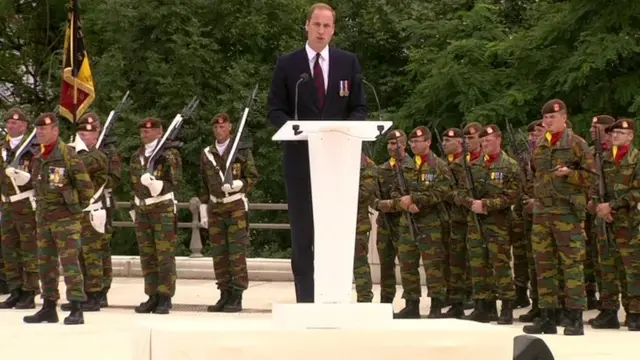
Speaking in Liege, the Duke of Cambridge describes the Belgian people's resistance "as gallant as their suffering was great".
The Duke of Cambridge is addressing the Liege service.
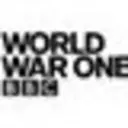 News from 1914
News from 1914
The world on the brink of war
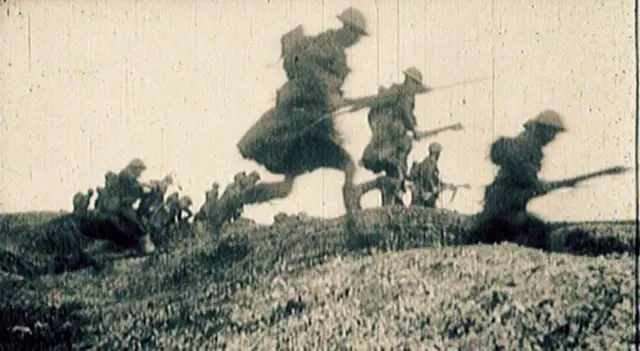 Image source, Getty Images
Image source, Getty ImagesSoldiers going over the top
Overview of WW1
World War One was fought in Europe, the Middle East, Africa and Asia. Around 17 million soldiers and civilians were killed between 1914 and 1918.
 Laura Bicker
Laura Bicker
Scotland Correspondent, BBC News, at Glasgow Cathedral
Voices from across the Commonwealth take their turns to read letters and prayers to those gathered in Glasgow. Representatives from India, Australia, New Zealand and Canada take their turn. And the cathedral listens to the anthem So they gave their bodies to the Commonwealth and received praise that will never die.
The service in Glasgow is hearing from a number of Commonwealth figures. New Zealand's Governor-General Jerry Mateparae and Commonwealth Secretary-General Kamalesh Sharma both deliver readings at the sombre event.
French President Francois Hollande told the Liege service that Belgium had been the first battleground of WW1. Addressing the service, he said Belgium had offered "solid resistance" in Liege and the civilian population had paid a "heavy price", adding that "deadly days" had followed when French and British soldiers joined the fight.
Sir Peter Cosgrove, Australia's Governor-General, reads the Solider Prayer of Commitment in Glasgow.
 Laura Bicker
Laura Bicker
Scotland Correspondent, BBC News, at Glasgow Cathedral
The organisers of today's service wanted to show the role the war played in changing our world. Part of that was the role played by women. They were needed in the field, in factories, mines, shipyards, hospitals and offices. It was a role which gained them more independence and freedom. But as Kate Adie tells the congregation at Glasgow Cathedral, "they were also to lose so very many they loved."
Margaret Champion emails: Listening to the panel with Huw Edwards half an hour ago on BBC1, one of the guests mentioned that some families lost as many as four sons in the war. In Great Rissington, Gloucestershire, the Souls family lost five sons. My own grandfather, Harry Bates, saw action around Ypres with the Yorkshire regiment - he survived the trenches but never spoke about the war and died in the 1970s when I was a teenager. I wish I had known more about his experiences but one didn't ask questions in those days.
 Laura Bicker
Laura Bicker
Scotland Correspondent, BBC News, at Glasgow Cathedral
Another familiar face now stands up in Glasgow Cathedral. War correspondent Kate Adie outlines the call to arms answered by the women of the Commonwealth. "It was a call to arms to play a role thought previously to be utterly and completely beyond a woman."
In Glasgow, Prime Minister David Cameron reads from St Mark's Gospel on the topic of service.
Speakers at Glasgow Cathedral are now paying tribute to those who supported the war effort on the home front. The role of women, who supported troops and families, is highlighted by Kate Adie. She reflects: "They were to gain more independence, more freedom. They were also to lose so very many they loved."
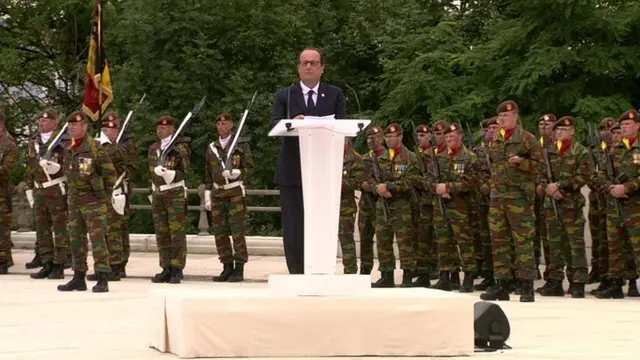
French President Francois Hollande is speaking at the Liege service.
The choir at Glasgow Cathedral are performing a beautiful rendition of Prayer for Peace.
Joseph Durno in Aberdeen, Scotland, emails: Joe Durno, my granddad and millions of others fought and lost their lives to give us our freedom today. They will never be forgotten, and I am proud to be named after him, I salute you all and can never ever forget what this war has given us, your children.
Mike Golding in Shropshire, England, emails: Commemorating the start of a war? Really? By all means remember those who died, but where was the hunt for the political failures that caused all that? Wars in all their forms are a scar on the face of humanity and our focus should be on preventing them, not commemorating them.
 Laura Bicker
Laura Bicker
Scotland Correspondent, BBC News, at Glasgow Cathedral
The familiar deep tones of Sir Trevor McDonald echo around Glasgow Cathedral telling the story of the outbreak of WW1.
The congregation includes leaders from across the Commonwealth. As they gathered to head into this historic cathedral, many wanted to talk about the success of the Commonwealth Games and last night's closing ceremony. But every conversation was cut short as soon as they headed through the cathedral arches. The celebrations are now put to one side. It is time to remember and reflect.
Among those gathered here is 16-year-old Kirsten Fell from Dunbar Grammar School who will read out an essay written after her visit to the battlefield of Flanders.
She was too nervous to speak beforehand, but she says her experience was so powerful that her outlook on life has never been the same.
"From around the globe, they heard the call and they responded," Sir Trevor McDonald tells Glasgow Cathedral. He pays tribute to the huge number of countries who sent men to fight in the war.
 News from 1914
News from 1914
The world on the brink of war
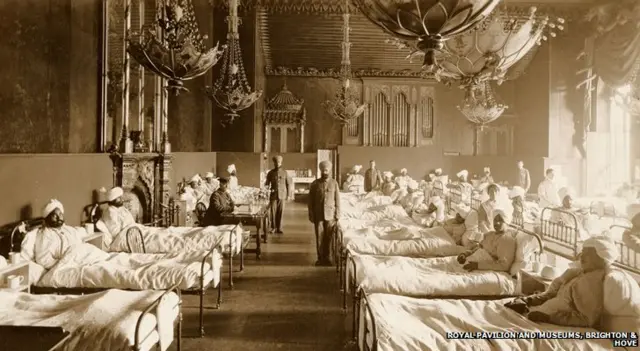 Image source, Royal Pavilion and Museums, Brighton & Hove
Image source, Royal Pavilion and Museums, Brighton & HoveIndian soldiers recuperating in Ward 5 (the Music Room) inside the Royal Pavilion, Brighton
The Royal Pavilion, Brighton, becomes a hospital for Indian soldiers
Indian soldiers made up one of the largest volunteer armies - with over 1.5 million serving in World War One. Wounded Indian troops were treated at a number of hospitals on the southern English coast, including the Royal Pavilion in Brighton.
Originally built in 1823 for King George IV, the Royal Pavilion was used as a military hospital from 1914. A total of 724 beds were available and more than 4,000 Indian soldiers and Ghurkhas were treated there.